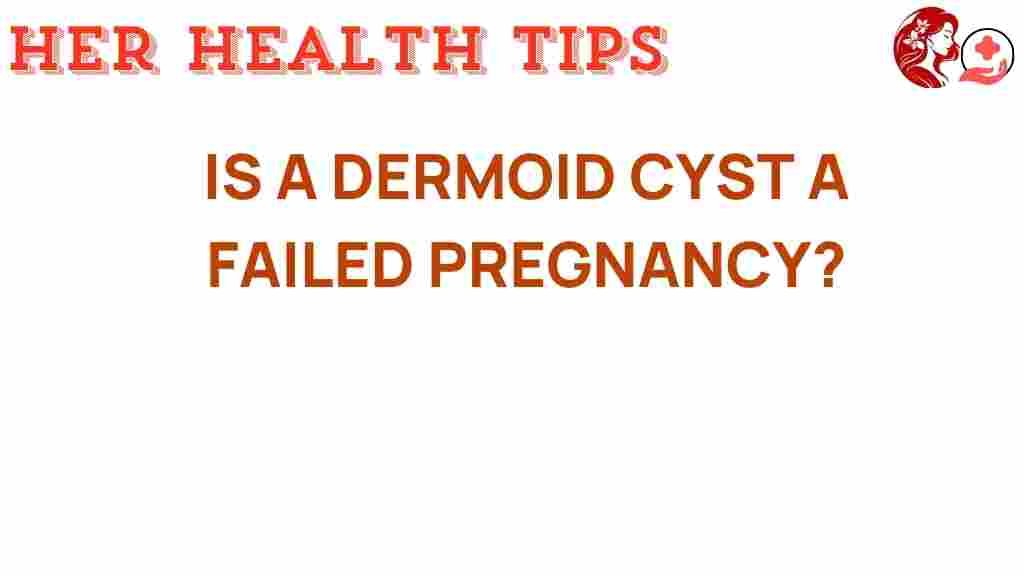Unraveling the Mystery: Is a Dermoid Cyst a Sign of Failed Pregnancy?
Understanding reproductive health is essential for women, especially when faced with conditions such as dermoid cysts. These growths are often misunderstood and can cause anxiety, particularly regarding their implications for pregnancy and fertility. In this article, we will delve into the relationship between dermoid cysts and failed pregnancy, dispelling medical myths and providing clarity on this topic.
What is a Dermoid Cyst?
A dermoid cyst, also known as a mature teratoma, is a type of ovarian cyst that can contain various types of tissues, including hair, skin, and even teeth. These cysts are typically benign, meaning they are non-cancerous. They can occur in women of all ages, but most commonly appear during the reproductive years.
Understanding Failed Pregnancy
Failed pregnancy refers to situations where a conception does not lead to a viable pregnancy or results in miscarriage. This can happen for numerous reasons, including chromosomal abnormalities, hormonal imbalances, or anatomical issues. Understanding the causes of failed pregnancy is crucial for women facing fertility issues.
Dermoid Cysts and Their Impact on Reproductive Health
Many women wonder if the presence of a dermoid cyst can affect their ability to conceive or lead to failed pregnancy. Here, we will explore the connection between dermoid cysts and various aspects of women’s health, particularly focusing on fertility issues.
Do Dermoid Cysts Cause Failed Pregnancy?
It’s a common misconception that dermoid cysts are directly linked to failed pregnancy. Here are some key points to consider:
- Usually Benign: Dermoid cysts are almost always benign and do not typically interfere with the normal functioning of the ovaries.
- Fertility Issues: While dermoid cysts can sometimes lead to complications or affect fertility in rare cases, they are not a primary cause of failed pregnancy.
- Miscarriage Factors: Many factors contribute to miscarriage, including genetic issues, uterine abnormalities, and hormonal factors—not dermoid cysts.
The Role of Ovarian Cysts in Pregnancy
Ovarian cysts, including dermoid cysts, are common among women of reproductive age. Here’s how they can relate to pregnancy:
- Monitoring: Most ovarian cysts, including dermoid cysts, are monitored through ultrasound during pregnancy to ensure they do not grow or cause complications.
- Symptoms: Some women may experience discomfort or pain from cysts, which may raise concerns during pregnancy but does not typically indicate a failed pregnancy.
- Surgical Intervention: In certain cases, surgical removal of a dermoid cyst may be necessary, but this is usually safe and does not affect future pregnancy chances.
Common Medical Myths About Dermoid Cysts
There are several myths surrounding dermoid cysts and their relation to pregnancy and fertility. Let’s debunk some of these:
- Myth 1: Dermoid cysts cause infertility.
Fact: While they can occasionally lead to complications, they do not inherently cause infertility. - Myth 2: All cysts indicate pregnancy complications.
Fact: Many cysts are benign and pose no threat to a healthy pregnancy. - Myth 3: Dermoid cysts are cancerous.
Fact: Most dermoid cysts are benign and do not develop into cancer.
Signs and Symptoms of Dermoid Cysts
Many women with dermoid cysts may not experience any symptoms. However, some may notice:
- Pelvic pain
- Irregular menstrual cycles
- Abdominal swelling
- Pressure symptoms in the bladder or rectum
If you experience any of these symptoms, it’s essential to consult a healthcare provider for evaluation and possible imaging studies.
Step-By-Step Process for Managing Dermoid Cysts
If you suspect you have a dermoid cyst or have been diagnosed with one, follow these steps to manage your health:
- Consult a Specialist: Schedule an appointment with a gynecologist or reproductive health specialist.
- Diagnostic Imaging: Undergo an ultrasound or CT scan to assess the cyst’s size and characteristics.
- Monitoring: If the cyst is benign and asymptomatic, your doctor may recommend monitoring it over time.
- Surgical Options: If the cyst is causing symptoms or growing, discuss surgical removal options with your doctor.
- Fertility Assessment: If you have concerns about fertility, ask for a fertility evaluation to understand your options.
Troubleshooting Tips for Women Facing Fertility Issues
Here are some troubleshooting tips for women who may be dealing with fertility issues and concerns about dermoid cysts:
- Stay Informed: Learn about your body and understand the role of conditions like dermoid cysts.
- Healthy Lifestyle: Maintain a balanced diet, regular exercise, and a healthy weight to improve overall reproductive health.
- Regular Check-ups: Keep routine appointments with your gynecologist to monitor any cysts and discuss any changes in your health.
- Seek Support: Consider joining support groups for women experiencing similar health issues.
Conclusion: Understanding Dermoid Cysts and Failed Pregnancy
In conclusion, while dermoid cysts can cause concern among women regarding their reproductive health and potential implications for failed pregnancy, they are typically benign and not a direct cause of infertility or pregnancy complications. It is vital to consult with healthcare providers for accurate diagnoses and appropriate management of any reproductive health concerns.
By staying informed and understanding the facts surrounding dermoid cysts, women can take proactive steps to maintain their reproductive health. For more information on ovarian cysts and women’s health, you can visit this informative resource.
If you have been misinformed about dermoid cysts, we encourage you to educate yourself and reach out to a qualified healthcare professional for guidance and support.
This article is in the category Reproductive and created by HerHealthTips Team
